We have far fewer secretaries and many less manufacturing jobs. But the secretaries are not in the headlines. Why? Male- and Female-Dominated Jobs In areas like manufacturing, there are many male-dominated jobs. Those male dominated jobs though tend to be…
Behavioral Economics
The intersection of psychology and economics, behavioral economics looks at human tendencies that involve biology and culture when predicting and explaining economic decision-making.
Debating the Success of U.S. Healthcare
When ranking national healthcare, organizations use statistics that can be misleading because they are based on averages that include irrelevant data.
The Magic of the MetroCard
The introduction of just one small MetroCard transformed NYC by lowering the transaction costs for traveling to work and friends in different boroughs.
Understanding the Big Numbers in the Federal Budget
Judging the Trump blueprint for the federal budget, we need to figure out how to compare trillion dollar totals to billion dollar proposals.
The World’s Most Expensive Bread
More than a number, the cost of living in the world’s most expensive cities is about bread and wine and who can afford to stay.
Why Measuring Happiness is Tough
Measuring happiness is tough because of the difference between what we actually experience and what we remember about those moments.
Finding the Hollywood Gender Gap (Everywhere)
From top stars’ salaries, to the people who speak in films, the Hollywood gender gap can be found in most of the major movies.
Why There is No Such Thing as Free Parking
Even in North Dakota where there is a ban on parking meters along town and city streets, there is no such thing as free parking.
The Ups and Downs of Tipping
Sometimes surprising and usually unpredictable, the reasons we tip make the tipping wage a controversial paycheck minimum.
Deciding How Much To Work
Illustrated by the Expedia Vacation Deprivation survey, how much vacation time we take can depend on where we live and our reference points.










